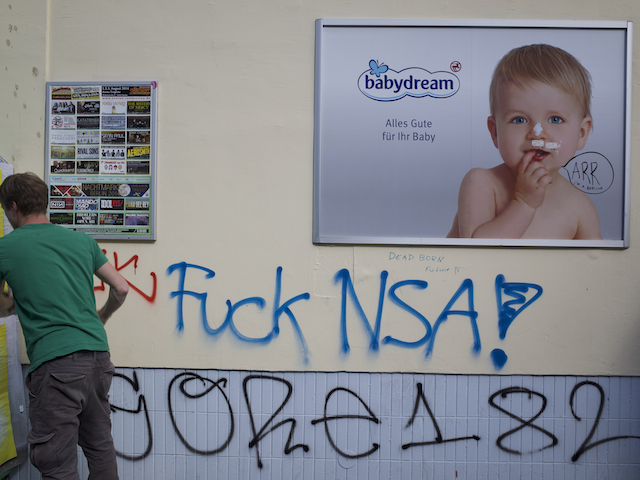What makes graffiti endlessly fascinating is the way its implications can broaden and shift over time. Taggers actively comment on the work of those who have gone before them, collectively fashioning a palimpsest that turns the passage of time into spatial relationships. And sometimes world events conspire to “comment” on this commentary, imparting new layers of significance.
All of the graffiti featured in this photograph from Berlin preceded the recent revelation that a German intelligence officer had been acting as a double agent for the United States. But it now seems to have been composed specifically for the occasion, particularly in light of the advertisement that it’s defacing.
Unlike the French, the Germans never made a huge deal about English’s corrosive effects on their native tongue. No government committees were convened to figure out how to express American and British concepts with their German equivalents. Respected publications consistently let cultural and technological terminology go largely untranslated, at times almost turning its prominence into a badge of honor.
That’s how you end up English-isms like “babydream”. The vast majority of Germans — even those who, because of their age or their origins in the former East, struggle with English — would have no trouble understanding the basic idea. “Baby” became a German word a long time ago and “dream” has appeared in far too many songs on popular radio and television to still sound totally foreign.
Yet, for of that, an undeniable air of otherness still surrounds the term. Presumably, the advertisement makes Germans think of American-style consumerism, which, for all of the United States’ loss of stature, is still associated a surfeit of choices. The tag line “Everything good for your baby” is more effective when paired with the implications of “babydream”, because Germans still believe in the “land of unlimited possibilities” where shopping is concerned.
While these are largely positive associations, there’s always the chance that a passerby will take this pseudo-English as a provocation. Decades of having a large number of American and, to a lesser extent, British troops on their home soil gave Germans a keen eye for the little indignities of occupation, even if they seemed delighted to be protected. In other words, despite nearly seventy years of friendship between the Federal Republic of Germany and its principal antagonists in the Second World War, there is always a possibility that the influence of English will fuel resentments.
In this case, it’s no accident that this perfect Aryan child’s “babydream” is rudely interrupted by a sly statement of support for the Pirate Party, which has strenuously critiquesdthe United States’ disregard for civil liberties. “Arr,” the baby declares, “I’m a berlina,” a clever inversion of John F. Kennedy’s famous “Ich bin ein Berliner”. English, paradoxically, becomes a way of poking fun at the American penchant to pay lip service on various issues without learning the language.
Immediately below the advertisement, the words “DEAD BORN FUTURE” implies that this “babydream” is a kind of nightmare. But it’s the much larger slogan at the bottom of that wall panel that really hammers the message home. “Fuck the NSA!” is such a blunt statement, without any attempt at subtlety, that it recasts the image of the infant as an allegory for a Germany at the mercy of its American “parent”.
Commentary by Charlie Bertsch. Photograph courtesy of Joel Schalit.





